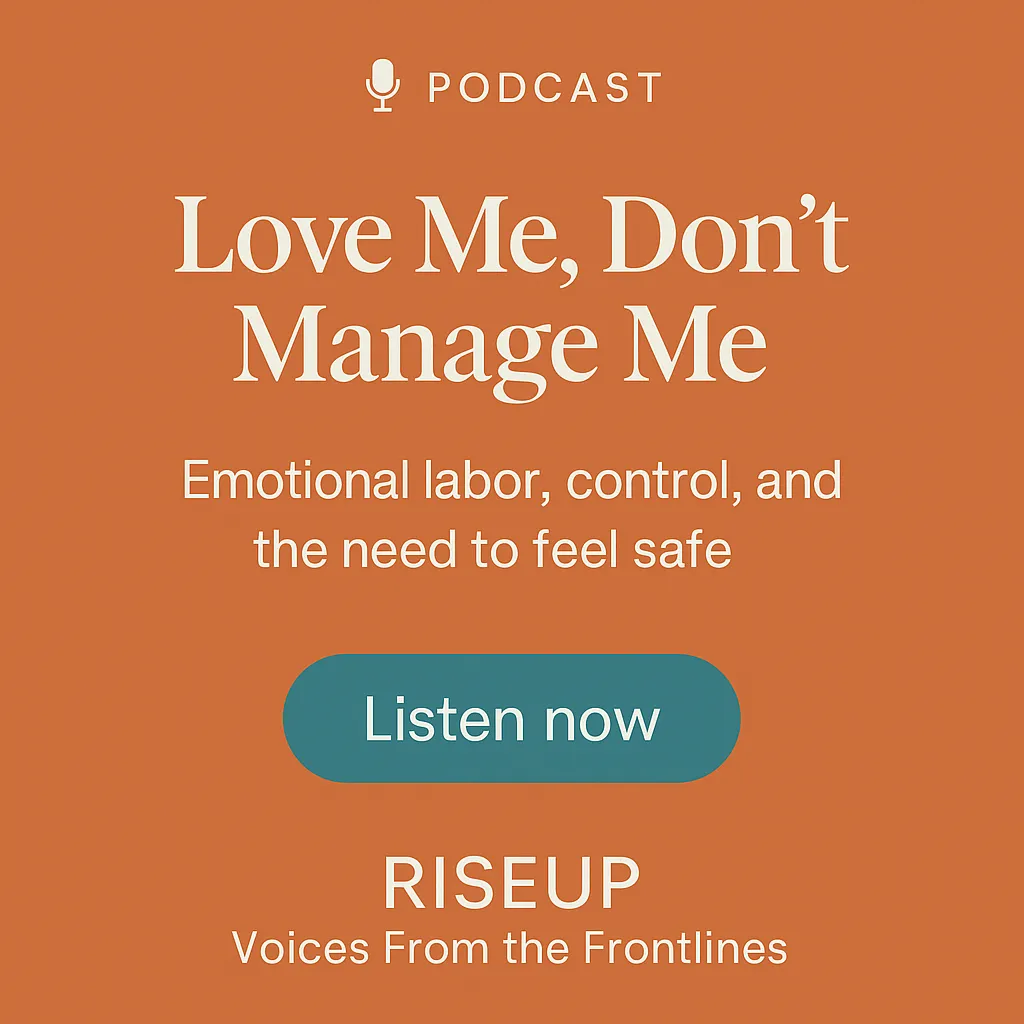
Relationship Reset: Love Me Don't Manage Me
Love Me, Don’t Manage Me: Emotional Labor, Control, and the Need to Feel Safe
By Krista Fee | RISEUP: Voices From the Frontlines | Relationship Reset Series
If you’ve ever found yourself walking on eggshells in a relationship, desperately trying to keep the peace or preempt a blow-up before it happens—you’re not alone. Many trauma-impacted relationships operate in quiet survival mode, where love starts to look a lot like management.
In this episode of RISEUP: Voices From the Frontlines, we’re talking about the invisible labor so many of us carry—the effort to keep everything “okay” at the cost of our own nervous systems. It’s called emotional labor, and it’s exhausting.
And the truth? What many of us call love is often just our nervous system trying to keep us safe.
The Emotional Landmine: When Love Feels Like a Job
For people with attachment trauma, safety can feel conditional. We learn to manage—our partner’s moods, reactions, energy—because somewhere along the line, we were taught that love had to be earned or maintained through performance.
This is not manipulation. This is protection.
It often sounds like:
“I just want peace.”
“I don’t want to rock the boat.”
“If I can stay one step ahead of their moods, maybe I’ll be okay.”
But over time, these behaviors erode connection. The message becomes: I don’t trust you to meet me, so I’ll do the work for both of us. That’s not love. That’s labor.
The Neuroscience of Control
Let’s take it to the brain.
When the amygdala senses threat—emotional or physical—it hijacks the prefrontal cortex, the area responsible for empathy, logic, and regulation. This triggers survival responses like:
Fight: Escalation, criticism, control.
Flight: Avoidance, overwork, emotional withdrawal.
Freeze: Numbness, disconnection.
Fawn: Over-functioning, people-pleasing, self-abandonment.
In trauma-impacted relationships, these responses aren’t about your partner. They’re ancient strategies designed to prevent pain. But ironically, they sabotage the very intimacy we crave.
Emotional Labor: The Hidden Load
In many relationships, one person becomes the emotional buffer—tracking needs, managing tension, smoothing over conflict. That person often ends up feeling resentful, depleted, and unseen.
Why? Because managing is not the same as connecting. Safety doesn’t come from control. It comes from mutual co-regulation and trust.
Five Ways to Shift From Control to Connection
If you find yourself managing instead of loving, here are five trauma-informed practices to explore:
1. Check Your Nervous System First
Before you respond to your partner, pause and ask: What’s happening in me right now?
Example: Your partner seems withdrawn. You feel anxious. Instead of spiraling, place a hand on your chest and name it: “I feel afraid of disconnection.” Just naming it helps interrupt the automatic urge to fix.
2. Use IFS-Inspired Language
Say: “A part of me feels…” instead of “I am…” This creates space between your core self and your protective parts.
Example: “A part of me wants to fix this fast so I don’t feel abandoned.” That shift fosters compassion for your survival patterns.
3. Offer Co-Regulation Instead of Correction
When tension rises, lead with calm.
Example: Your partner comes home irritable. Instead of saying, “What’s your problem?” try: “Looks like it was a tough day—I’m here if you need a minute.” That creates an invitation, not a power struggle.
4. Speak From Vulnerability, Not Strategy
Own your feelings without blaming.
Example: “When you pull away, a part of me feels like I’m being left behind. That’s hard for me.” Vulnerability softens defenses and builds connection.
5. Allow Space for Discomfort
Let the moment unfold without forcing resolution. Intimacy isn’t perfection—it’s repair.
Example: Your truth lands awkwardly. Instead of re-explaining, you breathe and stay present. That’s what safety looks like in action.
Healing Isn’t About Perfection. It’s About Presence.
You’re not broken if you’ve used control to feel safe. Those patterns are intelligent responses to unsafe experiences. But healing begins when we stop managing and start meeting—ourselves and each other—with honesty and compassion.
These shifts may feel awkward at first. But they’re the beginning of something far more powerful than performance: real connection.
🔗 JOIN THE RISEUP RELATIONSHIP RESET COMMUNITY
If you're ready to explore these dynamics more deeply, we invite you to join the RISEUP Relationship Reset™ community—a trauma-informed program designed for couples and individuals who want to build safer, more resilient love.
You’ll gain access to:
Science-backed relationship tools
Guided exercises and self-inquiry prompts
Community support and coaching from trauma-informed practitioners
🛡️ Register now → https://riseupphoenixinstitute.org/riseuprelationshipresetmembership47
🤝 SPONSOR WITH PURPOSE
Are you a brand, organization, or leader committed to building emotionally safe communities? We’re currently inviting aligned sponsors to support RISEUP: Voices From the Frontlines.
Your sponsorship supports:
Trauma education initiatives
Community resilience training
Mobile Crisis Pods for disaster response
📩 Request a sponsorship packet → battle2be.org
🌍 SUPPORT OUR CRISIS PODS
We’re raising $50,000 to equip Crisis Pods in Texas and Chicago—mobile units that bring emotional first aid, safety supplies, and trauma-informed resources where they’re needed most.
Every donation helps bring relief, hope, and tools for long-term healing.
🔗 Donate: [Insert Link]
You’re not here to perform love. You’re here to experience it.
And you don’t have to do it alone.
🎧 Listen to the full episode now → https://feeds.megaphone.fm/HERML4183537849
🏷 Tag us and share: #LoveNotLabor #RelationshipReset #RISEUPVoices #EmotionalSafety #TraumaInformedLove
